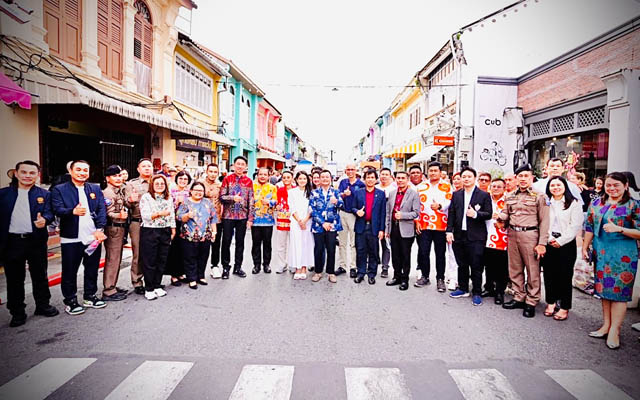On November 24, 2024, the Sustainable Tourism Development Foundation (STDF), in collaboration with public and private sectors, officially launched the Phuket Old Town Carbon Neutrality 2030 project, an initiative that positions Phuket’s historical district as Thailand’s first area to commit to achieving carbon neutrality.
Endorsed by Thailand’s Ministry of Tourism and Sports, the project aims to transform the Old Town into an international model for sustainable tourism while serving as a pilot for reducing carbon emissions across the province.

Bhummikitti Ruktaengam, president of the STDF and advisor to the Phuket Tourism Association (PTA), explained the rationale behind the initiative.
“Thailand has set ambitious KPIs: achieving carbon neutrality by 2050 and net-zero greenhouse gas emissions by 2065. However, Phuket currently lacks a concrete action plan to meet these goals. Recognising this gap, we decided to pilot a prototype on a smaller scale in the Old Town. If successful, it could serve as a model for broader implementation,” he shared.
Phuket’s Old Town was chosen due to its unique blend of tourism and local community life, as well as the willingness of its residents to participate in the project.
“Our goal is to significantly reduce carbon emissions in this area and achieve neutrality by 2030,” Bhummikitti added.
The project, spearheaded by the STDF, is jointly driven by Phuket City Municipality, the Big Data Institute (BDI), and the Old Town community. Its primary objective is to reduce carbon emissions by 30 per cent within three years and by 50 per cent by 2030.
Key strategies include introducing electric public transport, such as a new EV bus line around the area in collaboration with Phuket Smart Bus, improving public waste management systems and segregating home waste for recycling, and utilising AI to monitor emissions.
AI-integrated CCTVs, installed by the BDI, are already operational in Old Town, providing real-time data on traffic and pedestrian activity to track carbon emissions more accurately, particularly at the Thalang walking street.
“We collaborated with the BDI to classify numbers of vehicles passing through and their models, monitor foot traffic – because people bring waste into the environment – and estimate emissions. This data helps us paint a clearer picture of the area’s carbon footprint,” Bhummikitti explained.
Supporting institutions such as the Phuket Provincial Electricity Authority, the local fishers association, and the Pollution Control Department also supply data, which is fed into BDI’s centralised dashboard for analysis.
Additionally, a new organic waste composter, funded by the STDF, has been installed at the Golden Dragon Monument to reduce landfill dependency.
“This composter will handle organic waste from Old Town, reducing landfill contributions at Saphan Hin by at least 400kg daily,” Bhummikitti noted.
Looking ahead, STDF is collaborating with the Global Sustainable Tourism Council (GSTC) to position Phuket as a certified sustainable tourism destination. A sustainability audit is underway, with results expected by January 2025.
Phuket will also host the Global Sustainable Tourism Conference (GSTC2026) in May 2026, drawing over 700 participants and showcasing projects like the Old Town initiative.
“Achieving carbon neutrality involves two steps: reducing emissions as much as possible, then compensating through activities like tree planting,” Bhummikitti shared.
“At the end of January, when the GSTC audit results come in, we will see our current potential and what gaps we have to fill in order to achieve a sustainable destination label such as Green Destinations or EarthCheck, which will be another important step in accrediting Phuket as a sustainable tourism destination,” he concluded.


















